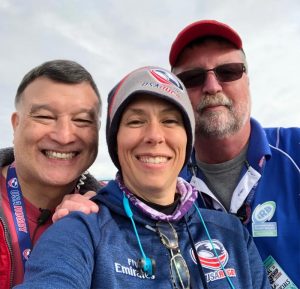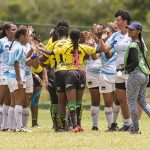We caught up with the referee coach to discuss her life in rugby and find out what needs to be done to create more opportunities for women to become match officials.
Amanda Cox admits that the first time she took the pitch as a referee her “mind was blown”.
Having picked up an oval ball while a student at Virginia Tech, Cox played for more than 15 years in the back-row before deciding it was time to find out what life was like on the other side of the whistle.
“I definitely thought that I knew more than the referees at times, yeah. And, then I became a referee just to put my money where my mouth was,” she told World Rugby.
“The first time I took the pitch as a referee my mind was blown. I mean, there’s so much decision-making that has to go on, and I think I’d played long enough in my career where it was no longer about winning.
“It was about rugby and the shape of the game and just the beauty of what rugby can be when it has flow and when it has continuity.
“I realised that it’s the referee that makes the difference. And then once I put those things together, it was just like, this is what I need to be doing and why haven’t I been doing this for the last 10 years?”
SUPPORTING THE NEXT GENERATION
By her own admission, that first match as a referee did not go smoothly for Cox, as she made an errant call and was heckled by one of the players.
However, she was grateful for the presence on the sidelines of an experienced referee who was on hand to offer his support.
“Another referee came out to my game just because he happened to be in the area and if he hadn’t been on the sideline after my first match, I don’t think I ever would have reffed again,” Cox admitted.
“I remember the flanker looked up at me at one point and he says, ‘Ma’am, are you going to make a call today?’ And I was like, ‘When I do, you’ll hear the whistle blow!’”
Cox made friends in the refereeing community close to her home in North Carolina and with their help and advice began a swift rise through the ranks of match officials in the USA.
It has always been important to Cox to provide the next generation of referees with the support network she craved, and so she soon became the first female certified Level 2 Coach of Match Officials in the USA.
She went on to become a member of the USA Rugby referee department’s high performance management group in 2016, has previously worked with Major League Rugby and attended the inaugural World Rugby Women’s High Performance Academy in 2019.
“It’s a very isolating experience, refereeing,” Cox said. “Maybe I don’t speak for everybody, but I think a lot of us play for the team mentality of the sport.
“So, then when you transition to being a referee here in the States, it can be very isolating. You go from being part of this big team to part of the referee crew.
“And, so you have a team… that you go to tournaments with, it’s a lot of camaraderie, a lot of really good stuff. But, there’s also 30 weekends of the year when you get in your car and you drive to the pitch by yourself
“When you’re first starting out, that’s a super-hard transition to make, until you’ve made friends with those people and been to a couple of tournaments.”
She added: “It definitely has helped me as a referee coach to know when to call my refs.
“I know usually which games are going to be taxing, I especially tell them it’s OK to cry because that’s just the way that you release the pressure. It’s all right.
“[There is] the old school mentality of, ‘oh, yeah, just shake it off, don’t cry’. But, no, just give it a good cry and then let’s talk about it.”
CREATING OPPORTUNITIES FOR WOMEN
Cox, who no longer actively referees herself, says she will spend an average of five hours talking to each of the match officials she manages per week.
That time will include preparation for matches and then de-briefs after them, and although she works predominantly with men Cox hopes that will change one day.
“I don’t think it’s challenging to find the women, I think it’s challenging sometimes to get them the opportunities,” she said.
“You see it outside of the rugby realm in any workspace where a woman may get one shot at something, and if she doesn’t do it perfectly, the next opportunity is going to go to a guy and he’s probably going to get three or four opportunities to do it well.
“And, I think that’s just a societal outcome of the way we’ve run the last hundred years, and I think it’s changing and we’re trying to make it change.
“I’m always fighting against the idea that women are slower and they’re not fast enough to run the upper-level games. But at the end of the day, when you look at the data, it’s just not true.
“And, luckily, we’ve got athletes like Sara Cox and Aimee Barrett-Theron, Amy Perrett and they’re out there showing everybody that it can be done, and Joy Neville too, right.
“And, it’s not going to be the first time you get on the major league stage that you do a great job. But no man’s getting out there and doing a great job the first time either.”
Does Cox have any advice for young women and girls who may be thinking about picking up a whistle? “Build your support network and don’t give up,” she said.
“It’s just reps, it’s keeping doing it, it’s having a philosophy and then it’s referring to your philosophy and watching that take shape and come to fruition.
“And, the better support you have, the easier it is to do.”
READ MORE: EMILEE CHERRY: FIVE MEMORABLE MOMENTS FROM THE CAREER OF A RUGBY SEVENS PIONEER >>
Source: www.world.rugby






